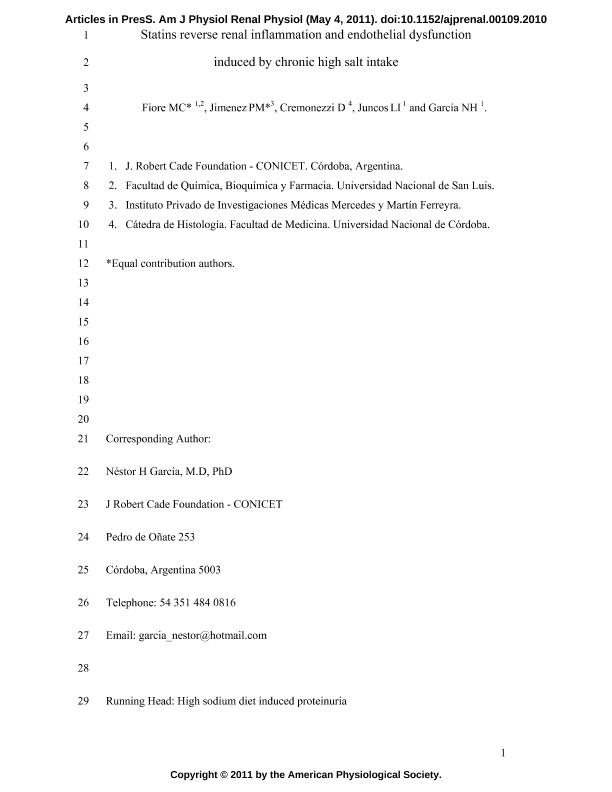Artículo
Statins reverse renal inflammation and endothelial dysfunction induced by chronic high salt intake
Fecha de publicación:
05/2011
Editorial:
American Physiological Society
Revista:
American Journal Of Physiology-renal Physiology
ISSN:
1931-857X
Idioma:
Inglés
Tipo de recurso:
Artículo publicado
Clasificación temática:
Resumen
High salt intake (HS) is a risk factor for cardiovascular and kidney disease. Indeed, HS may promote blood-pressure-independent tissue injury via inflammatory factors. The lipid-lowering 3-hydroxy 3-methylglutaryl-coenzyme A (HMG-CoA) reductase inhibitors exert beneficial lipid-independent effects, reducing the expression and synthesis of inflammatory factors. We hypothesized that HS impairs kidney structure and function in the absence of hypertension, and these changes are reversed by atorvastatin. Four groups of rats were treated for 6 wk in metabolic cages with their diets: normal salt (NS); HS, NS plus atorvastatin and HS plus atorvastatin. We measured basal and final body weight, urinary sodium and protein excretion (UProtV), and systolic blood pressure (SBP). At the end of the experimental period, cholesterolemia, creatinine clearance, renal vascular reactivity, glomerular volume, cortical and glomerular endothelial nitric oxide synthase (eNOS), and transforming growth factor (TGF)-β expression were measured. We found no differences in SBP, body weight, and cholesterolemia. HS rats had increased creatinine clearence, UProtV, and glomerular volume at the end of the study. Acetyl-choline-induced vasodilatation decreased by 40.4% in HS rats (P < 0.05). HS decreased cortical and glomerular eNOS and caused mild glomerular sclerosis, interstitial mononuclear cell infiltration, and increased cortical expression of TGF-β. All of these salt-induced changes were reversed by atorvastatin. We conclude that long-term HS induces inflammatory and hemodynamic changes in the kidney that are independent of SBP. Atorvastatin corrected all, suggesting that the nitric oxide-oxidative stress balance plays a significant role in the earlier stages of salt induced kidney damage.
Palabras clave:
ATROVASTATIN
,
BLOOD PRESSURE
,
KIDNEY INJURY
Archivos asociados
Licencia
Identificadores
Colecciones
Articulos(CCT - CORDOBA)
Articulos de CTRO.CIENTIFICO TECNOL.CONICET - CORDOBA
Articulos de CTRO.CIENTIFICO TECNOL.CONICET - CORDOBA
Citación
Fiore, M. C.; Jimenez, P. M.; Cremonezzi, D.; Juncos, L. I.; Garcia, Nestor Horacio; Statins reverse renal inflammation and endothelial dysfunction induced by chronic high salt intake; American Physiological Society; American Journal Of Physiology-renal Physiology; 301; 2; 5-2011; 263-270
Compartir
Altmétricas




